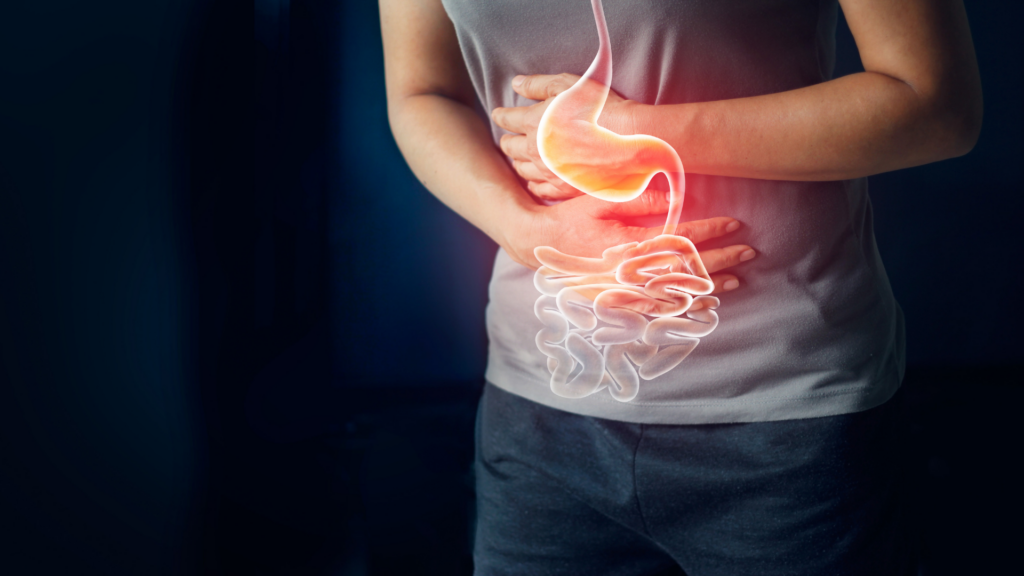Digestive issues are a big problem in the US. According to the National Institute of Diabetes and Digestive and Kidney Diseases, as of 2010 between 60 and 70 million people were impacted by all digestive diseases. As of 2004 $141.8 billion was spent on annual care for digestive diseases and disorders. That is a lot of people struggling with poor digestion!

Digestion problems have become a big focus in the natural health industry in the past few years. More people seem to be struggling with digestive issues such as IBS, IBD, GERD, leaky gut, bloating, constipation, diarrhea, and malabsorption than ever before. And these are just some of the digestive issues that we see in clients.
Both conventional and alternative practitioners tend to define a gut issue by looking at the symptoms alone. But this can be limiting because when talking about gut health, there are as many symptoms as digestive disorders.
Our goal is to help you understand more about digestion, common symptoms and healthy things you can do that can help improve it! So let’s go!
Common Symptoms of Poor Digestion
Do you struggle with poor digestion? If you do, you may experience some of the following symptoms of digestive distress.
Common symptoms are:
- Gas
- Bloating
- Indigestion
- Heartburn
- Diarrhea
- Constipation
- Nausea
These common symptoms often lead people to their local drugstore or grocery store to find products that can help provide relief. No wonder the market for over-the-counter digestive aids is a multi-billion dollar market. But while these symptoms are common, and relatively expected with digestive issues, there are other symptoms that are not as common.
Other symptoms of poor digestion:
- Headaches
- Joint Pain
- Edema
- Skin Rashes, Itching
- Hair Loss
- Low Energy
- Muscle Loss
- Depression, Anxiety, Irritability
Problems with digestion can have far-reaching impacts on your health. And you may have no idea that there is a connection between any of these symptoms and digestive distress.
The digestion process

When it comes to digestion, most people think about the stomach. But the truth is that digestion starts in the mouth. How well we chew our food and how much saliva is created both make a huge difference in how our digestive system finishes up the job. The more thoroughly you chew each bite, the more you break down that food into smaller particles. As you chew, your body releases saliva. The enzymes (amylase) in your saliva starts the process of pre-digestion by breaking down carbohydrate and starches in the food.
When the chewed food particles reach the stomach, HCl (hydrochloric acid) is released. That, in turn, activates the release of pepsin. Why is this important? When you eat protein, the molecules are folded up, much like a piece of paper you keep folding into a smaller square. For the amino acids in protein to be released, the molecule must be unfolded by HCl and then broken down by pepsin. If this doesn’t happen, most commonly by low stomach acid, the amino acids will not be released, and they will not be available for absorption in the small intestine. That is now food that is no longer fueling your body. For people with very low stomach acid, this can also lead to malnutrition.
Did you know….
Many symptoms of low stomach acid are the same as the symptoms of high stomach acid. Though high stomach acid is the most common diagnosis, low stomach acid is the most common cause! This may be caused by stress. When the stress response is activated, the body naturally decreases digestion so that energy can be conserved to face the current threat. The problem in our modern world is that most stress is mental and emotional, and is not caused by physical threats, such as facing a bear while walking through the woods. So, most people are in a state of chronic stress. This has led to an overwhelming amount of people who are struggling with low stomach acid. But they are being treated for high stomach acid.
Digestion is completed in the small intestine along with the absorption of nutrients. Leaky gut, biofilm, and dysbiosis can prevent many of the food’s nutrients from being used by your body despite how well digested it is and this also can lead to a deficiency of nutrients.
Food sensitivities and intolerances

This is another one of the most common issues that we see in clients. Food intolerance and sensitivities are different than an allergy to a food. Food allergies can be life-threatening. But that is not the case for sensitivities and intolerances. Food sensitivities are an inflammatory response that occurs in the body that can cause symptoms. However, this response may be delayed and so symptoms may occur hours or even days after eating the triggering food. Many people with food sensitivities never uncover their sensitivity because of this delay.
Food intolerances occur because the body lacks proper enzymes to break certain foods down. For instance, many suffer from lactose intolerance. In lactose intolerance, the body doesn’t have the enzymes needed to break down dairy products. This creates a digestive response. Food intolerances often run in families.
Here are some things you can do to help your digestion:
Chew your food well!
It is even more important if missing teeth or ill-fitting dentures are preventing thorough chewing of your food. You should be chewing each bite at least 20 times. That is required to release the enzymes needed to fully break down the food so that it can be digested.
Be mindful
How often do you pay attention to how different foods make you feel? This sounds a bit simplistic but taking the time to determine how different foods make you feel can also help you identify which foods may be causing the issues. You might even want to keep a food journal. This could help you to discover food patterns that can uncover hidden food sensitivities.
Drink your water!
Not drinking enough water can slow digestion. If drinking water before a meal, make sure to drink it at room temperature and at least 15 minutes before your meal so as not to dilute your stomach acid.
Take your time eating
Many people rush through meals, instead of taking their time. Rushing causes ineffective chewing and contributes to poor digestion.
Choose high-quality whole foods over processed foods
The body is better able to digest whole, natural foods than processed foods. Our bodies were not designed to digest all the chemical additives found in highly processed foods. And since many of these foods are devoid of proper nutrients, they don’t give your body the nutrients it needs to thrive.
Manage stress
We know that stress impacts the digestive system. So, it is important to practice stress management daily to help support proper digestion. Take a walk in nature, do some breathwork, practice yoga to reduce stress levels.
Test, Test, Test!
Testing is one of the best ways to gain an understanding of where imbalances are occurring in your digestion. So often people spend too much time and money guessing at how to overcome poor digestion. But we love using functional health testing. Using the right tests helps our health detectives get to the root of where health imbalances are occurring. And they help take away the guessing and give you the answers to how to begin rebuilding your health the right way.
If you are interested in working with us see if we are a match for you. Contact us today to learn more!








